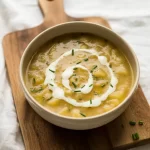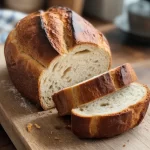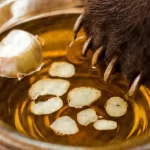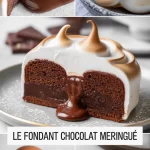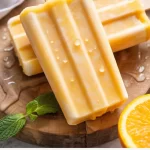I’m sharing my Easy Meringue Cookies and the one baker’s trick that changed how I make them.

I never thought whipped sugar could steal the show until I made these. Light as air, perfectly sweet and oddly addictive, they melt on your tongue and leave you wondering how that can be real.
Using egg whites and superfine sugar you get crisp shells with marshmallow centers, the kind that make a cookie tray look like an event. I bring them to gatherings and call them Easy Meringues, people always ask if I cheated.
Take one and you’ll be curious how something so simple can seem impossible, I still cant figure it out sometimes.
Ingredients

- Mostly protein give meringues their airy lift and crunchy shell not much else
- Sugar is pure carb, gives sweetness and structure to whipped egg whites
- Acid like cream of tartar or lemon helps proteins hold air, texture improves
- Salt just wakes up the flavor makes the sugars taste less flat
- Vanilla adds warm aroma and depth, it makes them taste more interesting
- Cornstarch or powdered sugar keeps them dry and crisp, handy in humidity
- Food coloring only for looks, no nutrients, a couple drops change the vibe
Ingredient Quantities
- 4 large egg whites room temperature (about 120 g)
- 1 cup (200 g) superfine or granulated sugar
- 1/2 teaspoon cream of tartar (or 1 teaspoon lemon juice)
- 1/8 teaspoon fine salt
- 1 teaspoon pure vanilla extract
- 1 tablespoon cornstarch or 2 tablespoons confectioners’ sugar (optional)
- Gel or liquid food coloring a few drops (optional)
How to Make this
1. Preheat oven to 200°F (95°C) and line baking sheets with parchment or silicone mats; have 4 large egg whites at room temp ready and make sure your mixing bowl and beaters are totally clean and grease free, no yolk bits either.
2. In the bowl add the egg whites, 1/2 teaspoon cream of tartar (or 1 tsp lemon juice) and 1/8 teaspoon fine salt, then start whipping on medium speed until foamy.
3. Once foamy, turn the mixer to high and add 1 cup (200 g) superfine sugar very slowly, a tablespoon at a time, whipping between additions so the sugar dissolves; if you only have granulated pulse it in a food processor so it’s finer.
4. Keep whipping until you get glossy stiff peaks and the sugar feels totally dissolved when you rub a little between your fingers, no grit; this can take 5 to 10 minutes depending on your mixer.
5. Fold in 1 teaspoon pure vanilla extract, then gently sift in 1 tablespoon cornstarch or 2 tablespoons confectioners sugar if using, this stabilizes and helps the insides stay slightly tender; if you want color add a few drops of gel or liquid food coloring now and fold just until streaks disappear, dont overmix.
6. Transfer the meringue to a piping bag fitted with a tip or use two spoons to dollop; pipe or spoon small rounds about 1 inch apart onto the prepared sheets, they look best with a star tip but plain blobs are fine too.
7. Smooth any sharp peaks with a damp fingertip if you want a neater look, then put the trays in the oven and bake low and slow so they dry out without browning.
8. Bake about 90 to 120 minutes at 200°F (95°C) for typical small cookies, smaller ones may be done in 60 to 90 minutes; they should lift off parchment easily and sound hollow when tapped.
9. Turn the oven off and let the meringues cool completely inside the closed oven for at least 1 hour so they dry fully and dont crack from a sudden temp change.
10. Store completely cooled meringues in an airtight container at room temp for up to a week, dont refrigerate or they’ll absorb moisture and get chewy.
Equipment Needed
1. Oven set to 200°F (95°C)
2. 2 baking sheets lined with parchment paper or silicone mats
3. Stand mixer (whisk attachment) or a hand mixer with totally clean beaters
4. Mixing bowl, glass or metal, grease free (no yolk bits)
5. Measuring cups and spoons plus a kitchen scale for the grams
6. Fine mesh sieve for cornstarch or powdered sugar, or a small food processor to superfine granulated sugar
7. Piping bag with a star tip (or two spoons) and a rubber spatula for folding/scraping
8. Airtight container for storing the cooled meringues, room temp only, dont refrigerate
FAQ
Meringue Cookies Recipe Substitutions and Variations
- Egg whites: replace with aquafaba (chickpea liquid). Use about 2–3 tbsp aquafaba per egg white, so for 4 whites use ~8–12 tbsp (roughly 1/2–3/4 cup). It whips a bit softer and may take longer to dry.
- Sugar: if you dont have superfine, blitz regular granulated sugar in a food processor for 10–20 seconds to make it superfine, or use caster sugar 1:1. Powdered sugar can work (use the same weight, 200 g) but cookies will be chewier and may need different drying time.
- Cream of tartar: swap with an acid, about 1 tsp lemon juice or 1/2 tsp white vinegar in place of the 1/2 tsp cream of tartar. They stabilize the whites, just expect a tiny tang.
- Cornstarch / confectioners sugar: you can use arrowroot or potato starch 1:1 for the cornstarch, or substitute the optional cornstarch with 2 tbsp sifted powdered sugar like the recipe suggests. Omitting it makes the surface shinier and less powdery.
Pro Tips
1) Use an oven thermometer and learn your oven. Home ovens often run hotter than the dial says, so if your meringues brown or crack cut the temp by 10 to 20 degrees F and add time. Close the oven and resist opening it, even to peek, or they may crack.
2) Make sure the sugar is actually dissolved. If you feel any grit between your fingers it’s not done, and that grit will make a grainy cookie. If you only have regular sugar pulse it in a blender or food processor till fine, and add it very slowly while whipping so it dissolves.
3) Bowl and eggs matter more than you think. Use a spotless metal or glass bowl (plastic can hold grease), separate whites carefully, then let them sit at room temp 20 to 30 minutes before whipping. If you have a copper bowl even better, copper stabilizes the foam and gives glossier, stronger peaks.
4) Fight humidity and store smart. Meringues go soft fast in damp air, so make them on a dry day if you can. After cooling store them in an airtight container with a small silica packet or a paper towel to absorb moisture, never refrigerate or they’ll get chewy.

Meringue Cookies Recipe
I’m sharing my Easy Meringue Cookies and the one baker’s trick that changed how I make them.
24
servings
37
kcal
Equipment: 1. Oven set to 200°F (95°C)
2. 2 baking sheets lined with parchment paper or silicone mats
3. Stand mixer (whisk attachment) or a hand mixer with totally clean beaters
4. Mixing bowl, glass or metal, grease free (no yolk bits)
5. Measuring cups and spoons plus a kitchen scale for the grams
6. Fine mesh sieve for cornstarch or powdered sugar, or a small food processor to superfine granulated sugar
7. Piping bag with a star tip (or two spoons) and a rubber spatula for folding/scraping
8. Airtight container for storing the cooled meringues, room temp only, dont refrigerate
Ingredients
-
4 large egg whites room temperature (about 120 g)
-
1 cup (200 g) superfine or granulated sugar
-
1/2 teaspoon cream of tartar (or 1 teaspoon lemon juice)
-
1/8 teaspoon fine salt
-
1 teaspoon pure vanilla extract
-
1 tablespoon cornstarch or 2 tablespoons confectioners' sugar (optional)
-
Gel or liquid food coloring a few drops (optional)
Directions
- Preheat oven to 200°F (95°C) and line baking sheets with parchment or silicone mats; have 4 large egg whites at room temp ready and make sure your mixing bowl and beaters are totally clean and grease free, no yolk bits either.
- In the bowl add the egg whites, 1/2 teaspoon cream of tartar (or 1 tsp lemon juice) and 1/8 teaspoon fine salt, then start whipping on medium speed until foamy.
- Once foamy, turn the mixer to high and add 1 cup (200 g) superfine sugar very slowly, a tablespoon at a time, whipping between additions so the sugar dissolves; if you only have granulated pulse it in a food processor so it’s finer.
- Keep whipping until you get glossy stiff peaks and the sugar feels totally dissolved when you rub a little between your fingers, no grit; this can take 5 to 10 minutes depending on your mixer.
- Fold in 1 teaspoon pure vanilla extract, then gently sift in 1 tablespoon cornstarch or 2 tablespoons confectioners sugar if using, this stabilizes and helps the insides stay slightly tender; if you want color add a few drops of gel or liquid food coloring now and fold just until streaks disappear, dont overmix.
- Transfer the meringue to a piping bag fitted with a tip or use two spoons to dollop; pipe or spoon small rounds about 1 inch apart onto the prepared sheets, they look best with a star tip but plain blobs are fine too.
- Smooth any sharp peaks with a damp fingertip if you want a neater look, then put the trays in the oven and bake low and slow so they dry out without browning.
- Bake about 90 to 120 minutes at 200°F (95°C) for typical small cookies, smaller ones may be done in 60 to 90 minutes; they should lift off parchment easily and sound hollow when tapped.
- Turn the oven off and let the meringues cool completely inside the closed oven for at least 1 hour so they dry fully and dont crack from a sudden temp change.
- Store completely cooled meringues in an airtight container at room temp for up to a week, dont refrigerate or they'll absorb moisture and get chewy.
Notes
- Below you’ll find my best estimate of this recipe’s nutrition facts. Treat the numbers as a guide rather than a rule—great food should nourish both body and spirit. Figures are approximate, and the website owner assumes no liability for any inaccuracies in this recipe.
Nutrition Facts
- Serving Size: 14g
- Total number of serves: 24
- Calories: 37kcal
- Fat: 0.01g
- Saturated Fat: 0.01g
- Trans Fat: 0g
- Polyunsaturated: 0g
- Monounsaturated: 0g
- Cholesterol: 0mg
- Sodium: 20mg
- Potassium: 8mg
- Carbohydrates: 8.7g
- Fiber: 0g
- Sugar: 8.7g
- Protein: 0.55g
- Vitamin A: 0IU
- Vitamin C: 0mg
- Calcium: 0.35mg
- Iron: 0.01mg







